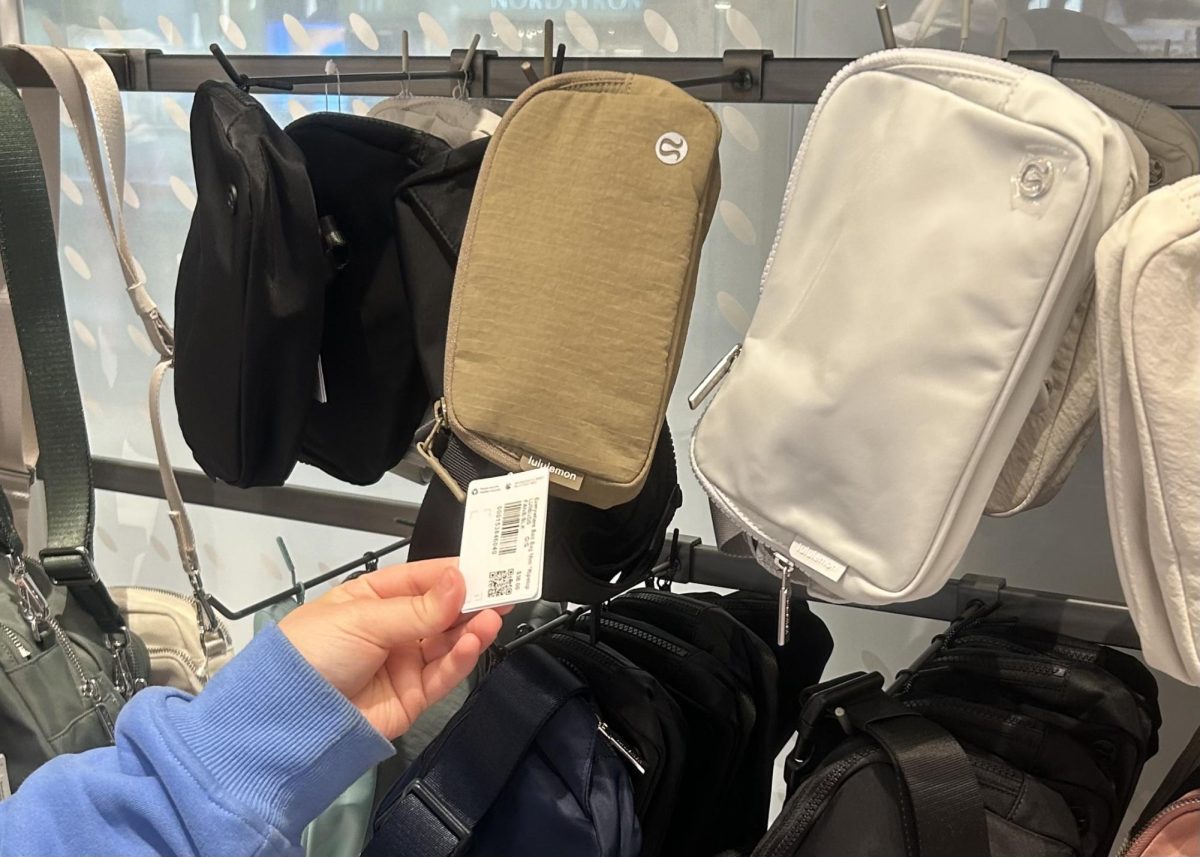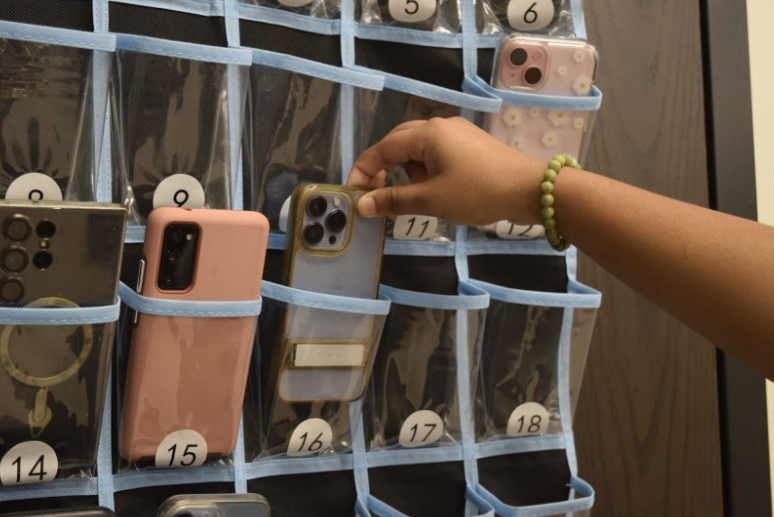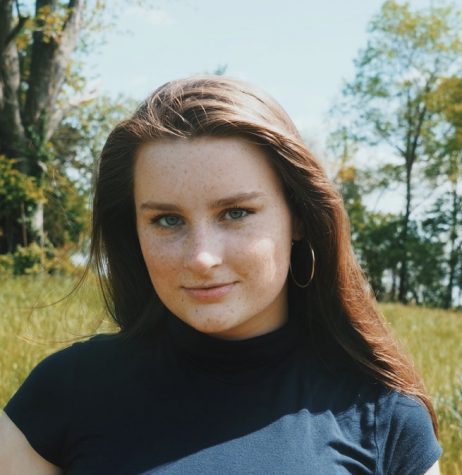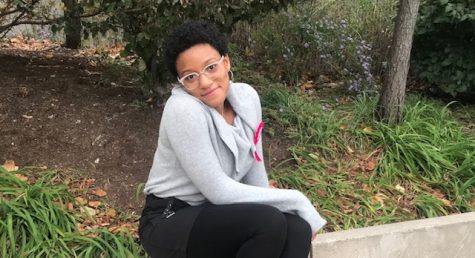
Transcript: [Funky music comes in.]
Bri: I ain’t ever seen two pretty best friends.
Zoe: Chile! Anyways, so…
Bri: It’s the salty attitude for me.
Zoe: Go off sis!
Bri: Periodddddt.
Bri: Just because we are primarily discussing race relations between Black and white, does not mean we don’t believe that other race oppression exists. We are coming at this from a personal perspective, but our hope is that as we grow, we can widen the conversation. Our hope is not to offend, but to educate and we are still learning ourselves.
(Any music played in this episode is from Pixabay.com or Anchor)
Zoe: African American Vernacular English, better known as ebonics, is the language often used by members of the Black community.
Scholars argue about the official name, but many are actively straying from the word ‘ebonics’ because it has been commonly tied to racist comments and carries a long history of oppression.
Some use the terms African American English or Black English, but African American Vernacular English, abbreviated as AAVE, is the term that many academic circles have landed on as it emphasizes the distinction between Standard American English and AAVE. For the purposes of this episode, we will be using the term AAVE.
Another ongoing discussion is about where AAVE even came from and whether it can be considered its own language at all.
Dictonary.com explains that calling AAVE a dialect of English supports the Anglicist Hypothesis, which was the widely held opinion of how AAVE evolved until the 1960’s, explaining that African-enslaved people on Southern plantations acquired English from their British owners.
A more updated opinion might look like calling AAVE a language, which models the Creolist Hypothesis view, that AAVE originated from a creole (or a language that has developed from a mixture of different languages) spoken on Southern plantations before the Civil War. Linguists of this view say AAVE arose from a creole in West Africa that enslaved people already spoke before coming to the US.
But AAVE has been popularized, or more so appropriated, by internet culture. The phrases, “chile! Anyways,” or, “it’s the ____ for me,” and terms like “lit,” “slay,” and “go off,” can be seen repeatedly used by non-native AAVE speakers, who appropriate a “Blaccent”—all in the hopes of sounding funny and relatable.
[Music changes to a beat.]
Bri: Now that we have gotten some background about what AAVE is and where it came from, I would now like to share a main point with you that is an example of a failed attempt to show and use AAVE. Now, some of you may know a term that is called “Blaccent.” For those who do not, Dictionary.com defines a Blaccent as the imitation of Black English by non-Black people. To expand on that, not only is a blaccent the repeated usage of AAVE in a non-native speaker’s vocabulary, it is the impersonation of a stereotypical Black person’s mannerisms and speech.
To allow you guys to be able to visualize that in your head, I would like to share an example with you. My example today is social media star Whoa Vicky. For those that do not know who she is, she is a 19 year old who became famous when she claimed that she was Black and belonged to the Black community. She is a rapper, and some of you may even know her from a problem she had with Danielle Brigoli, aka 17 year old Bhad Bhabie, who is also a rapper like her [Whoa Vicky]. I chose Whoa Vicky as my example because she uses Blaccent in a very negative way. Some things that she does is she uses the N word purposefully. [And] that word is very controversial but she believes that she is entitled to use it because she believes that she is Black. She shows a lot of cultural appropriation with hairstyles, hairpieces (like bonnets and durags); she does it with twerking, grills in the mouth and so on. All of that is what she thinks is Black culture. She is personifying what she thinks is Black culture. Now, there is a difference between purposefully putting on a blaccent versus a native speaker using AAVE. I would like to show that difference by also sharing a story of my own, so that you guys can hopefully relate a little bit more.
Now, unlike Whoa Vicky, where she is purposefully putting on a Blaccent, [for] me, it naturally happens. [And] what I mean by that is, one day I was walking away from practice with friend and another group of my friends came up to us: my Black friends. [And] I went and talked to them [for] a little bit and when I came back, my friend noticed something about the way I changed my voice. She goes, “You know, you do that a lot.” [And] I said, “Do what?” And then she goes, “You talk differently when you’re talking to your Black friends.” Now, I didn’t know this at the time, but there is a term for that, it’s called ‘code-switching.’ And that‘s basically when somebody alternates between two or more languages or varieties of language in a conversation, which blows my mind. [But basically] it was a feeling of realization for me, like a ‘Eureka’ moment, because it [code-switching] is something that i’ve just done, just naturally done. It naturally happens, so when she called me out on it I was like, “Oh wow, I never knew that before!” And then I realized that I constantly have to do that at school in the classroom, and just when I am talking to my white friends. It’s just kind of how I was raised. The only time [though] that I don’t really have to do it is when I am with Black coaches in sports, because I feel that having someone of my color—they make me feel comfortable–and I have no worries of having to pretend I’m someone I’m not. So I don’t necessarily code-switch at that moment.
Zoe: My first experience with AAVE is a bit different than Bri’s.
The current demographic of Mason Ridge, my elementary school, is 68.7% white and only 11.1% Black. Despite that, a large majority of my friends in elementary school were not white.
One of my closest friends in elementary school was Black and we spent a lot of time together during school and on playdates. We had a lot in common, like watching Disney Channel and dancing, and rarely, if ever, did we notice or acknowledge our differences. This was one of the first moments where I came face-to-face with a key difference between us, and it was our speech.
We were in class, and she said something along the lines of, “I been doing that.”
She used “been” in a way I thought was incorrect, and, as a self proclaimed English expert, I corrected her, thinking that Standard American English, or the way that I spoke as a white kid, was automatically correct.
I don’t remember her reaction and you could probably call me an ignorant 11 year old for doing this, but as disgusting as it makes me feel now, I remember seeing her as more uneducated because of this so-called grammar mistake.
Many people who don’t speak AAVE regard it as inferior, like I did. In situations like this, they wrongly assume that AAVE speakers are attempting, but failing to speak Standard American English. In reality, AAVE is just as grammatical, it just follows different rules.
I doubt I am alone in my childhood experience of ignorantly considering AAVE as ‘uneducated speech,’ but now more than ever, I’ve noticed a continuous usage of AAVE by non-Black people, and I am confident this stems from the internet. I’ll be honest, I’ve found myself using terms that I heard on TikTok and Youtube that I thought were hilarious at the time and the phrase “go off” has made its way into my vocabulary more times than I can count. But looking back, I know these were gentrified terms that were first used by the Black community.
When researching AAVE to create this episode, I stumbled across a video made by Youtuber Bri Nobles, who made some amazing points.
In her Youtube video titled, “Why are all the white kids trying to sound Black?” She dives into how Gen-z has begun to use AAVE and claims it as ‘internet language.’ She calls this phenomena “digital blackface.” I wanted to define digital blackface and in that search I found an article from Women’s Health magazine where Jardin Dogan, a counselor and educator specializing in Black mental health, explained that digital blackface is, “when non-Black people use the images and voices of Black individuals to explain emotions or phenomena.” Dogan goes on to say that digital blackface, “Perpetuates negative stereotypes about Black people—that they’re overly-animated, loud, aggressive, angry, hypersexual, and much more.” Much like a modern day minstrel show, non-black people are embodying an assumed Blackness to make other White people laugh.
Nobles brought something else up that I didn’t want to skip pointing out, and it was that Black, queer ballroom culture is a large creator of the most popular and gentrified terms. Terms like “sis,” “periodt,” “mama,” “slay,” and “yassss.”
A final quote that I wanted to grab from Bri’s story is, “You can love it and you can appreciate it (in regards to AAVE), and you can partake in it, but when it comes to embodying blackness as a choice, and trying to use it as a means to become funny and entertaining, it becomes a problem.”
[Three quirky notes play, transition into Bri’s part.]
Bri: The overall lesson from the previous topic with Bri Nobles is basically explaining why it’s wrong.
White people are utilizing AAVE with no consequences, whereas when the originators, the Black community, use AAVE, our society off the bat deems it as “ghetto.”
It’s unfair for white people to use a language that native AAVE speakers are oppressed over.
For example, linguicism, or the discrimination based on language, is a common experience for a Black person in America. Author and linguistics educator at Columbia University, John McWhorter, an author and linguistics educator at Columbia University, [he] notes that this particular discrimination is especially prominent in the United States as opposed to countries like Morroco, Finland and Italy, where diglossia, a conscious change in language, is more commonly observed and respected.
With that being said, we really need to understand the purpose of AAVE.
Richey Collazo of Affinity Magazine wrote about AAVE beautifully. He explained that, “[AAVE] was our way to let another Black person know that we are here for each other. It was a way for Black people to get messages across that they didn’t want white people being aware of. It was a way for Black people who had their African roots forcibly stripped to assimilate to European ways for slave labor usage to form a new cultural identity among our people. It is our language.”
Zoe: in some cases, using AAVE as a non-native speaker is akin to mocking the Black community, a community that has been oppressed and denied opportunities for speaking in that same manner.
When AAVE is used by its originators it is denounced as “ghetto” and uneducated, but when it is used by white people, it is seen as humorous and relatable.
Racism runs deep and it has roots that latch onto things that, in the moment, can seem small, like speech and language—but in the bigger picture, changing even the smallest things can be just as important as the big, if our goal is to make the world safe for Black people.
We are not saying that all non-native AAVE speakers have to cut out every single article of speech that originates from AAVE. But, to use the language of another culture, a culture that is oppressed and cast down for their own use of the language, can easily be seen as careless. There is a fine line between appreciation and mockery, and that line is continually crossed.
Bri: We’ve given you many reasons why using AAVE as a non-native speaker can be harmful. Now, here are some ways to stay vigilant in avoiding the appropriation of AAVE.
First, Acknowledge that AAVE is a language on its own and educate yourself and others on the terms that you are using.
Two: avoid using AAVE just to promote yourself, especially on social media. If the only way you can be funny and get famous is by appropriating the language of an oppressed group, you shouldn’t get famous.
Three: if you’re consistently peppering your speech with AAVE terms and you’ve put on a “blaccent,” you’ve crossed the line from appreciation to appropriation. Before using terms or mannerisms that don’t sound like you and that may have originated from the Black community, think twice about the impact your words and actions could have, and let the Black community keep their speech.
And lastly, be able to accept when you are in the wrong and take criticism and if the Black community says you’ve stepped over that line, you should listen.
Zoe: That brings us to the end of this episode. As you leave today, tonight, or whatever time you’re listening to this, we hope that you feel better equipped to recognize and even call out AAVE appropriation on the internet and in real life. The only way for real change to occur is with uncomfortable conversations like this.
Any sources used in this episode can be found in our transcription notes on pwestpathfinder.com.
We thank you so much for listening, and we’ll see you in the next episode of It’s Not Black and White.
Sources referenced in the episode::
- https://www.dictionary.com/e/united-states-diversity-african-american-vernacular-english-aave/
- https://www.babbel.com/en/magazine/cultural-appropriation-drag-slang-aave
- http://affinitymagazine.us/2016/05/22/aave-is-for-black-people-and-black-people-only/
- https://babe.net/2018/02/28/who-is-woah-vicky-instagram-star-victoria-waldrip-aka-icky-vicky-explained-38820
- https://www.distractify.com/p/how-did-woah-vicky-get-famous
- https://pixabay.com/music/
- https://www.youtube.com/watch?v=ultGOYJVwd4
- https://www.dictionary.com/browse/dialect
- https://www.languagejones.com/blog-1/2014/6/8/what-is-aave
- https://www.youtube.com/watch?v=VOgKI4QNGlU
- https://en.wikipedia.org/wiki/Linguistic_discrimination#African-Americans




![Senior Dhiya Prasanna examines a bottle of Tylenol. Prasanna has observed data in science labs and in real life. “[I] advise the public not to just look or search for information that supports your argument, but search for information that doesn't support it,” Prasanna said.](https://pwestpathfinder.com/wp-content/uploads/2025/10/DSC_0073-2-1200x800.jpg)
![Junior Fiona Dye lifts weights in Strength and Conditioning. Now that the Trump administration has instituted policies such as AI deregulation, tariffs and university funding freezes, women may have to work twice as hard to get half as far. "[Trump] wants America to be more divided; he wants to inspire hatred in people,” feminist club member and junior Clara Lazarini said.](https://pwestpathfinder.com/wp-content/uploads/2025/05/Flag.png)
![As the Trump administration cracks down on immigration, it scapegoats many immigrants for the United States’ plights, precipitating a possible genocide. Sophomore Annabella Whiteley moved from the United Kingdom when she was eight. “It’s pretty scary because I’m on a visa. When my visa expires next year, I’m not sure what’s going to happen, especially with [immigration] policies up in the air, so it is a concern for my family,” Whiteley said.](https://pwestpathfinder.com/wp-content/uploads/2025/05/DSC_0077-7copy.jpg)
![Shifting global trade, President Donald Trump’s tariffs are raising concerns about economic stability for the U.S. and other countries alike. “[The tariffs are] going to pose a distinct challenge to the U.S. economy and a challenge to the global economy on the whole because it's going to greatly upset who trades with who and where resources and products are going to come from,” social studies teacher Melvin Trotier said.](https://pwestpathfinder.com/wp-content/uploads/2025/05/MDB_3456-1200x800.jpg)



![Some of the most deadly instances of gun violence have occurred in schools, communities and other ‘safe spaces’ for students. These uncontrolled settings give way to the need for gun regulation, including background and mental health checks. “Gun control comes about with more laws, but there are a lot of guns out there that people could obtain illegally. What is a solution that would get the illegal guns off the street? We have yet to find [one],” social studies teacher Nancy Sachtlaben said.](https://pwestpathfinder.com/wp-content/uploads/2025/01/DSC_5122-1200x800.jpg)




Lois Lintag • Apr 14, 2021 at 2:38 pm
Good day, Good night, or whatever time you are reading this. I’ve downloaded TikTok last year as I wanted to keep myself entertained during this pandemic, I didn’t realized that the comments I was reading, the phrases I’ve been using–that I mostly see from TikTok were AAVE. Until this Tuesday– April 13, 2021. A black woman in my Fyp, saying that using AAVE is modern-day minstrel. I didn’t know what minstel was nor AAVE (I’m not from the America)–but I wanted to hear what she’s saying, or to know if I were being harmful to any community. I looked it up that night and finally understand what she meant, I found out where AAVE came from, and what it meant to use it as a non-black person. I wanted to know more about AAVE, and I found a recently written article–which is from your page! I’m only 15 years old and I’m glad to be educated regarding this topic at a young age. Thank you for your hard work.